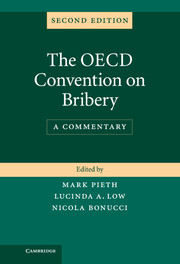Introduction
from Part I - Introduction
Published online by Cambridge University Press: 05 March 2015
Summary
Preamble to the OECD Convention
The Parties,
Considering that bribery is a widespread phenomenon in international business transactions, including trade and investment, which raises serious moral and political concerns, undermines good governance and economic development, and distorts international competitive conditions;
Considering that all countries share a responsibility to combat bribery in international business transactions;
Having regard to the Revised Recommendation on Combating Bribery in International Business Transactions, adopted by the Council of the Organisation for Economic Co-operation and Development (OECD) on 23 May 1997, C(97)123/FINAL, which, inter alia, called for effective measures to deter, prevent and combat the bribery of foreign public officials in connection with international business transactions, in particular the prompt criminalisation of such bribery in an effective and co-ordinated manner and in conformity with the agreed common elements set out in that Recommendation and with the jurisdictional and other basic legal principles of each country;
Welcoming other recent developments which further advance international understanding and co-operation in combating bribery of public officials, including actions of the United Nations, the World Bank, the International Monetary Fund, the World Trade Organisation, the Organisation of American States, the Council of Europe and the European Union;
Information
- Type
- Chapter
- Information
- The OECD Convention on BriberyA Commentary, pp. 3 - 56Publisher: Cambridge University PressPrint publication year: 2013
References
Accessibility standard: Unknown
Why this information is here
This section outlines the accessibility features of this content - including support for screen readers, full keyboard navigation and high-contrast display options. This may not be relevant for you.Accessibility Information
- 4
- Cited by
